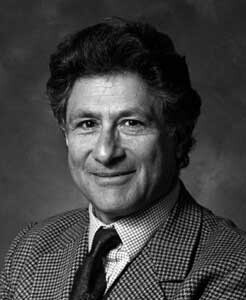Columbia University 26 September 2003

Edward W. Said
President Lee Bollinger said:
“Edward Said was a man of enormous intellectual distinction. He was devoted to, and intimately engaged with, works of art, especially the novel and the poem. He was a humanist who believed that such study is essential to a good and meaningful life. And through his writings and teaching he transformed our sense of ourselves by forcing us in the Western world to confront the implicit assumptions we have about other peoples around the globe. His death is an irreplaceable loss to the realm of ideas and for those who believe in the redemptive power of the life of the mind.
University Provost Alan Brinkley said:
“Edward Said was a great scholar, a great teacher, and a beloved member of the Columbia community for 40 years. His many works on literature, theory, music, and politics have influenced generations of students and teachers around the world. Among many other things, he taught us new ways of looking at other cultures and invited us to take assumptions we are tempted to consider universal and place them in their particular social contexts. We will greatly miss this kind, gentle, and generous colleague and friend. It is hard to imagine Columbia without him.”
Edward Said was born in Jerusalem in 1935, but spent most of his life in the United States. He received degrees from Princeton and Harvard before coming to Columbia, where he spent most of his adult life. His many books include Beginnings (1975); Orientalism (1978); The Question of Palestine (1980); Covering Islam (1981); The World, the Text and the Critic (1983); After the Last Sky (1986); Blaming the Victims (1987); Culture and Imperialism (1992), and The Politics of Dispossession (1995). His Wellek and Reith Lectures were published as, respectively, Musical Elaborations and Representations of the Intellectual. Peace and Its Discontents appeared in 1996, Out of Place: A Memoir in 1999, and The End of the Peace Process: Oslo and After in 2000. Reflections on Exile appeared in 2000, as well as The Edward Said Reader, and in 2001, Power, Politics, and Culture. His books are translated into 36 languages.
Professor Said received honorary doctorates from Bir Zeit, Chicago, Michigan, Jawaharlal Nehru, Jami’a Malleyeh, Toronto, Guelph, Edinburgh, Haverford, Warwick, Exeter, National University of Ireland and American University in Cairo. He twice received Columbia’s Trilling Award and the Wellek Prize of the American Comparative Literature Association, and was a member of the American Academy of Arts and Sciences, the American Philosophical Society, the Royal Society of Literature, and a member of King’s College, Cambridge, and an Honorary Fellow of the Middle East Studies Association. In 1999 he was President of Modern Languages Association.
A memorial service will be scheduled in the coming weeks.